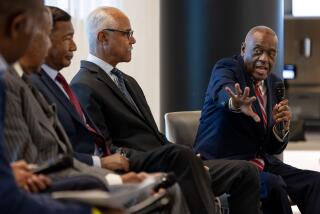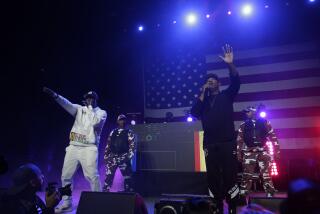Book Mark : Is Eisenhower to Blame for Civil Rights Explosion?
WASHINGTON — President George Bush must turn from the Persian Gulf euphoria to focus on thorny domestic issues. The nation’s civil-rights constituencies are preparing for a major battle over legislation the Administration slid into public view the week the ground war ended. Many civil-rights questions Bush faces today could have been eased considerably had one of his most popular Republican predecessors, Dwight D. Eisenhower, handled issues on the home front as deftly as he led troops into battle.
The crisis over school desegregation in Little Rock, Ark., in 1957, encapsulating the fierce conflict between the maturing civil-rights movement and segregationist resistance, presented Eisenhower with his most difficult domestic challenge. But it also offered an opportunity to reach out to responsible leaders, black and white, and forge a positive response to the dilemma of race relations.
The question was whether Eisenhower could handle the challenge. The issue was joined when Arkansas Gov. Orval Faubus, claiming integration would touch off violence, posted the Arkansas National Guard at Little Rock’s Central High School, to block nine black students scheduled to start school Sept. 3.
Little Rock typified the sort of situation Eisenhower most abhorred. He preferred politics free from open disagreement. Eisenhower made plain to his staff that he considered Faubus’ actions none of the federal government’s business. The President did not blame Faubus; rather he complained about “these people who believe you are going to reform the human heart by law.”
At a press conference, Eisenhower spoke of “strong emotions” held by opponents of integration, “people that see a picture of the mongrelization of the race,” adding, “We are going to whip this thing in the long run by Americans being true to themselves, and not merely by law.”
But the Little Rock crisis could not wait for the long-run solution Eisenhower envisaged. Faubus’ defiance of the federal courts served as a rallying point for forces on both sides of the issue.
To Eisenhower, leadership did not consist of hitting people over the head. “Any damn fool can do that,” he would say. To him, leadership was “persuasion and conciliation and education and patience. It’s long, slow tough work. That’s the only kind of leadership I know--or believe in or will practice.”
Accordingly, as the Supreme Court’s 1954 decision forced the country to confront the issue of school segregation, Eisenhower maintained a neutral posture. “At no time did Mr. Eisenhower attempt to use the moral force of his office to persuade Southerners of the justice of the course the Supreme Court required of them,” commented journalist Harry S. Ashmore, whose Arkansas Gazette editorials criticizing Faubus’ actions won the Pulitzer Prize.
Eisenhower allowed the struggle to drag on unnecessarily. First, he went ahead with a vacation at Newport, R.I.; then he resisted suggestions to go back to the White House, saying he did not want “to exaggerate the significance” of events.
Faubus suggested a face-to-face meeting. They met at the Newport naval base. Eisenhower told Faubus that, in any trial of strength between them, “The state would lose, and I (do) not want to see any governor humiliated.” Faubus left Eisenhower with the impression he would accept a deal to end the impasse. Instead, the governor continued to use the National Guard to keep the black students out. Eisenhower did nothing.
In Little Rock, support for Faubus and his actions grew. But, on Sept. 20, under pressure of a federal injunction, Faubus pulled out the guard. He claimed no responsibility to preserve order.
The following Monday, Sept. 23, the inevitable occurred: The nine black students found the school surrounded by angry demonstrators. The mob shouted threats until authorities gave in and ordered the blacks to withdraw. The next day, the mob, then numbering in the thousands, seemed in control of the school.
At last, Eisenhower realized the whole world was watching. He dispatched 1,000 men of the 101st Airborne Division and federalized the Arkansas National Guard. Within a few hours, truck convoys roared into position and troops carrying carbines and billy clubs took up positions around the school. The next morning, Sept. 25, Central High School was integrated.
Eisenhower addressed the nation on television; again he ignored an opportunity to bridge the gap between the races. Stressing that he was sending in troops only to enforce the law, not because he favored desegregation, Eisenhower made no mention of the indignities inflicted on the black children, nor of their right to an equal education.
Long after the showdown in Little Rock, its legacy endures in U.S. politics. Disillusioned by Eisenhower’s temporizing, blacks turned their backs on his party. No recent GOP presidential candidate has even come close to winning the nearly 40% of the black vote Eisenhower gained in 1956--the best George Bush could do in 1988 was 12%. Meanwhile, Eisenhower’s retreat helped the GOP establish itself as the party of the white South. For their part, Democrats, who became the party of civil rights, have only captured a majority of the white vote once since Eisenhower’s time--in 1964 when President Lyndon B. Johnson defeated Sen. Barry M. Goldwater.
America’s ever-present racial tensions cannot, of course, be blamed on Eisenhower. But he bears a heavy burden--he was probably better positioned than any other President to move race relations in a more positive direction. He enjoyed immense popularity among black and white, North and South. He could have reassured whites about the impact of racial change while making them realize they had no choice. At the same time, the example of his leadership would have served to foster blacks’ faith in the political system.
Eisenhower was President when the attitudes of his country were in transition. The Supreme Court’s decision on integration, the subsequent birth of the civil-rights revolution, the burgeoning ambition in the postwar New South for economic development--all combined to create a climate receptive to discarding old shibboleths and searching for new approaches. Eisenhower could have created, rather than reacted to, the events that shaped the society we live in.
More to Read
Get the L.A. Times Politics newsletter
Deeply reported insights into legislation, politics and policy from Sacramento, Washington and beyond. In your inbox three times per week.
You may occasionally receive promotional content from the Los Angeles Times.










